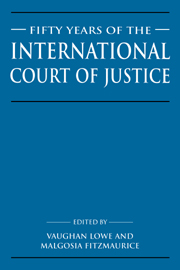Book contents
- Frontmatter
- Contents
- List of contributors
- Preface
- List of abbreviations
- Sir Robert Yewdall Jennings, by Vaughan Lowe
- List of publications of Sir Robert Jennings
- Table of cases
- Part I The International Court of Justice
- Part II The sources and evidences of international law
- Part III Substance of international law
- Part IV Procedural aspects of the work of the International Court of Justice
- 21 Procedural law and the International Court of Justice
- 22 The President of the International Court of Justice
- 23 Nationality of claims: some relevant concepts
- 24 The plea of domestic jurisdiction before the International Court of Justice: substance or procedure?
- 25 ‘Partial’ judgments and the inherent jurisdiction of the International Court of Justice
- 26 Intervention before the International Court of Justice
- 27 The use of Chambers of the International Court of Justice
- 28 The use of experts by the International Court of Justice
- 29 Provisional measures
- 30 Remedies in the International Court of Justice
- 31 A comment on the current health of Advisory Opinions
- Part V The International Court of Justice and the United Nations
- Index
25 - ‘Partial’ judgments and the inherent jurisdiction of the International Court of Justice
Published online by Cambridge University Press: 02 November 2009
- Frontmatter
- Contents
- List of contributors
- Preface
- List of abbreviations
- Sir Robert Yewdall Jennings, by Vaughan Lowe
- List of publications of Sir Robert Jennings
- Table of cases
- Part I The International Court of Justice
- Part II The sources and evidences of international law
- Part III Substance of international law
- Part IV Procedural aspects of the work of the International Court of Justice
- 21 Procedural law and the International Court of Justice
- 22 The President of the International Court of Justice
- 23 Nationality of claims: some relevant concepts
- 24 The plea of domestic jurisdiction before the International Court of Justice: substance or procedure?
- 25 ‘Partial’ judgments and the inherent jurisdiction of the International Court of Justice
- 26 Intervention before the International Court of Justice
- 27 The use of Chambers of the International Court of Justice
- 28 The use of experts by the International Court of Justice
- 29 Provisional measures
- 30 Remedies in the International Court of Justice
- 31 A comment on the current health of Advisory Opinions
- Part V The International Court of Justice and the United Nations
- Index
Summary
In traditional terms the basis of the jurisdiction of the International Court of Justice has always been presented as resting on the consent of the parties. This consent may be given by various means. At one end of the spectrum we find the clearest and most specific of submissions in an express agreement between the parties accepting the jurisdiction of the Court, setting out the question and indicating precisely the manner in which the dispute may be brought before the Court. At the other end lies the implied acceptance of the Court's jurisdiction arising from the operation of the concept of forum prorogatum – by which the plaintiff party opens the door to the Court's jurisdiction by instituting proceedings which, at the moment of inception, have either no basis, or only an uncertain basis, in terms of evidence of the consent of the respondent. The door having thus been opened, the respondent thereupon, so to speak, walks through it by performing some act that is treated by the Court as evidence of consent. Between these two extremes lie other means of expressing consent, such as the use of the Optional Clause or of separate, successive and ultimately concordant acts of the parties. The Court has emphasized that the identification of consent is not governed by questions of form. What matters is that there should be real evidence of consent.
- Type
- Chapter
- Information
- Fifty Years of the International Court of JusticeEssays in Honour of Sir Robert Jennings, pp. 465 - 486Publisher: Cambridge University PressPrint publication year: 1996
- 2
- Cited by



